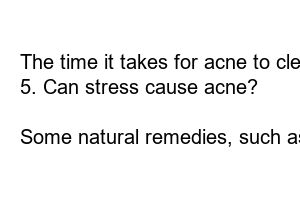다래끼 나는 이유
Acne is a common skin condition that affects millions of people worldwide. It can be frustrating and embarrassing, but understanding why it occurs can help you take steps to prevent and treat it. In this blog post, we will explore the reasons why you may be getting acne and what you can do about it.
**Genetics play a significant role**
Your genes can play a big role in whether or not you develop acne. If your parents had acne, you are more likely to experience it as well.
**Hormonal changes are a common trigger**
Hormonal changes, such as those that occur during puberty, menstruation, pregnancy, or menopause, can contribute to acne flare-ups.
**Clogged pores lead to breakouts**
When oil and dead skin cells clog your pores, it creates an ideal environment for acne-causing bacteria to thrive, leading to breakouts.
**Certain medications can cause acne**
Some medications, such as corticosteroids, lithium, and some birth control pills, can trigger acne breakouts as a side effect.
**Diet and lifestyle choices can impact your skin**
Consuming a diet high in processed foods, dairy, and sugar can exacerbate acne. Additionally, not properly cleansing your skin or using harsh products can also contribute to breakouts.
**Stress can worsen acne**
Stress releases hormones that can increase oil production in the skin, leading to more frequent breakouts.
**Environmental factors may play a role**
Exposure to pollutants, humidity, and certain chemicals can irritate the skin and contribute to acne development.
In conclusion, acne can be caused by a combination of genetic, hormonal, dietary, lifestyle, environmental factors, and stress. By understanding the reasons why you may be getting acne, you can make changes to your skincare routine, diet, and lifestyle to help prevent and treat breakouts.
**FAQs**
1. Can acne be cured completely?
Unfortunately, there is no cure for acne, but it can be effectively managed with proper skincare and treatment options.
2. Does diet really impact acne?
While more research is needed, some studies suggest that reducing dairy, sugar, and processed foods can help improve acne.
3. Is it okay to pop pimples?
Popping pimples can lead to scarring and infection, so it’s best to avoid this practice.
4. How long does it take for acne to clear up?
The time it takes for acne to clear up varies for each person, but consistency with treatment can help speed up the process.
5. Can stress cause acne?
Yes, stress can trigger acne flare-ups by increasing oil production in the skin.
6. Are there any natural remedies for acne?
Some natural remedies, such as tea tree oil, aloe vera, and honey, may help with acne, but results vary for each individual.

